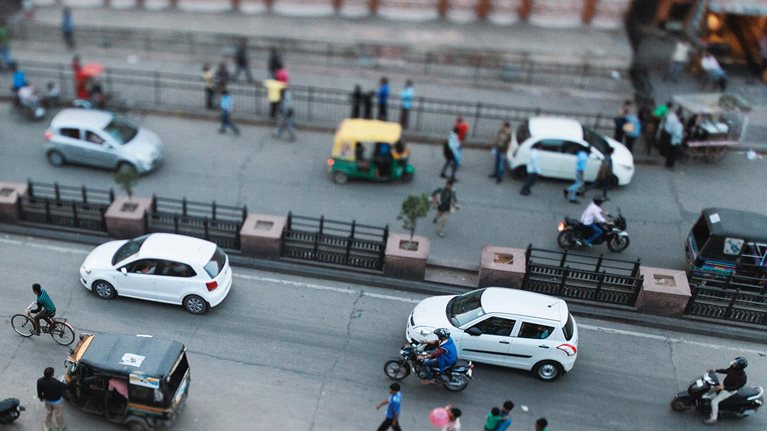Even before COVID-19 hit, the Indian auto industry was beginning to sputter. Through 2019, even as gas prices were falling and population growth continued apace, auto sales were pulling back—down more than 10 percent for the year. Then, in mid-March, came the COVID-19 pandemic. In April and May 2020, the country’s auto sales declined by a further 90 percent.
Guenter Butschek, CEO and managing director of Tata Motors, has never been one to take his foot off the gas. An industry veteran—he worked at Daimler AG for 25 years and, prior to joining Tata Motors, was the COO of Airbus—Butschek has been focusing on consolidating the foundational capabilities of cost, quality, modularity, and new-product development at Tata Motors. Yet the COVID-19 crisis presented challenges that neither he nor any other major OEM, in any country, had confronted before: devastating hits to the home economy, severe shocks to supply chains, worried dealers and anxious customers—not to mention more than 80,000 employees now confronting the crisis and looking for leadership.
Butschek recently took some time to offer his perspective to McKinsey’s Rajat Dhawan and David Schwartz on how the pandemic has affected Tata Motors, how he and his organization are adapting, and what might be in store for the automotive industry in India and beyond.
The Quarterly: Many CEOs have told us that COVID-19 amplified existing trends seen before the pandemic. Does that resonate with you?
Guenter Butschek: Yes. Like every company, we’ve moved the safety, health, and well-being of our employees to the forefront of our decision making. It was always important, of course, but COVID-19 made it urgent. We also used the downtime of India’s nationwide lockdown to rethink, redesign, and reengineer how we work, where possible. For example, the lockdown was our opportunity to significantly accelerate the adoption of digital technology. The importance of becoming more digital was already obvious pre-COVID, but its onset has exponentially catalyzed the need.
Individually, every business unit and function in Tata Motors designed and created their own virtual forums and platforms for engaging with stakeholders. This helped us minimize physical interactions. We also launched a program called “Click to Drive” and put it on the fast track. It’s an integrated, end-to-end digital sales channel that lets customers arrange everything in a contactless way—from the test drive, financing options, all the way to booking their car or SUV of choice. This was all new, but still consistent with our credo: playing to win while remaining fit to compete.
The Quarterly: What has the pandemic meant for leaders at Tata Motors? What’s changed for them?
Guenter Butschek: We deployed a comprehensive business-continuity plan to manage the survival phase, the restart, and now the fast-track recovery. It’s a micromarket approach with very specific nuances, which means that decisions must be made by people close to events, close to the market and the front line. And our people have been making great decisions.
We have a strong conviction: high-performing teams make faster and better decisions. [So we have focused] on making our teams more agile, fast, and responsive, but also [made sure] that they are cross-functional, with nonhierarchical structures. This has really proven successful in accelerating decision making. It’s vitally important, because the way we hardwire changes now will define our future.
Other leadership characteristics—empathy, open communication, transparency—have also served us well during the crisis and need to be more hardwired into the culture, as they will be as relevant tomorrow as they are today.
Would you like to learn more about our Automotive & Assembly Practice?
The Quarterly: Has the pandemic changed your priorities as a leader, or otherwise affected how you lead?
Guenter Butschek: There was no blueprint for managing the crisis. Such unprecedented times give you the opportunity to reflect on your past experience—to look around and see your learning opportunities, and adapt your approach.
I have tried to ensure my management style is accommodative and inclusive. And I’ve engaged as much as possible with my executive team, and also actively with employees, vendor partners, dealers, channel partners, customers, industry bodies—everyone. Trust and transparency have been my guiding principles for this engagement, whether it’s through town halls, focus groups, or other meetings. But the objective isn’t just to give direction. Much more important, it has been about hearing people, listening intently, and gaining a deeper understanding of their concerns, constraints, and risks—and, when possible, providing quantitative and qualitative support.
And with the boundaries between personal and professional life more fluid now, it feels like we know one another better as well, as people expose all the talents and interests they didn’t share before—from scale modeling to photography to culinary skills to music. It brings our people together and can even be humbling that in spite of all the uncertainties, fears, and challenges, our people continue to perform with such vigor—and rigor.
The lockdown was our opportunity to significantly accelerate the adoption of digital technology. The importance of becoming more digital was already obvious pre-COVID, but its onset has exponentially catalyzed the need.
The Quarterly: Has the pandemic caused you to reflect more on the company’s purpose?
Guenter Butschek: Yes, it has. I am sure this will resonate with other companies across the region, but first and foremost COVID-19 reminded us that it’s our rich values and larger purpose that drive the organization. How we do what we do and the role we play in society at large are equally important. We don’t just represent ourselves or the organization, but a broader legacy. The onus of responsibility is significantly larger, more accentuated.
Trust plays a key role. At Tata Motors, this means active engagement and involvement with the communities in which we operate. We must always look after their well-being and welfare. [The pandemic] reinforces how we are all interconnected and responsible for one another in ways beyond what we might have envisaged—whether it’s employees, customers, suppliers, or communities. We have worked hard to stand with our ecosystem partners, and I think this purposeful, ecosystem-centered approach is helping us weather the crisis—or at least weathering it better. As an organization, we can only be as strong as our ecosystem, and we are committed to coming out stronger after the crisis together.
The Quarterly: Let’s change focus if we could and look at trends shaping the industry. Take a concept like mobility, which is evolving, but in the classic imagination has historically been equated with the automobile as a “freedom machine.” How is the future of mobility shaping up in India? Are we moving toward more shared mobility, mobility as a service? Or will the automobile continue to be a highly personal expression?
Guenter Butschek: If you would have asked me the same question pre-COVID, my answer would have been very different. Before, we were seeing a clear shift toward the “asset light” model, led by India’s young population, with its clear preference toward a shared economy. They didn’t want the hassle of car ownership with maintenance, parking, et cetera. Several start-ups created a business out of the shift—with varying degrees of success.
Post-COVID, the world has changed. Customers are now seeking safe, personal mobility solutions. We see a clear shift toward ownership for both two-wheelers and four-wheelers; because [of the virus], both are considered to be much safer to use than public transport. We are seeing an increase in first-time buyers, customers who possibly wouldn’t have had such priorities before. Convenient financing and lower down payments are contributing to this.

Reimagining mobility
The Quarterly: How sustainable is the shift?
Guenter Butschek: That’s the big question. Is the demand a flash in the pan or something else? After we get a vaccine, after we’re out of the COVID-19 scare, for lack of a better term, will customer priorities shift back? India’s starting point is different from other countries. The US has 800 cars per 1,000 people. Germany has about 600. India is about 22 cars per 1,000 people. Yet the same trends and challenges around technology affect India too—in connectivity, electrification, advanced driver-assistance systems. These trends are the same everywhere.
Not that long ago, I would have taken the bet that India would leapfrog other countries in some of these developments—the so-called ACES1 trends—leveraging the country’s social-demographic differences. Now, with COVID, we need to give this frog a little bit more time.
[The pandemic] reinforces how we are all interconnected and responsible for one another in ways beyond what we might have envisaged—whether it’s employees, customers, suppliers, or communities.
The Quarterly: Let’s look ahead ten years. Paint a picture of India, and Tata Motors.
Guenter Butschek: I’d say the only thing you can take for granted is that in ten years’ time I will have retired. [Laughs.] But on a more serious note, in 2030, India will most likely have the third- or fourth-largest economy in the world. Household consumption will have doubled; the government’s investment in reducing poverty and enhancing social capital through education, health, skill development, infrastructure, and affordable housing all will have started yielding sustained benefits, complementing those derived from economic growth. That potential to leapfrog in technology and other developments will remain strong.
For Tata Motors, I’m sure that by 2030 we will have become a much more agile organization, continuing to embrace the advances in technology for connecting aspirations with innovative mobility solutions, and all with a strong commitment to enhance the quality of life in the communities we operate in.


